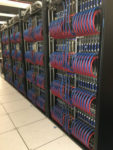April 22, 2022 — The U.S. National Science Foundation (NSF) has awarded $7.5 million over five years to the Resource Allocations Marketplace and Platform Services (RAMPS) project, a next-generation system for awarding computing time in the NSF’s network of supercomputers. Led by the Pittsburgh Supercomputing Center (PSC), a joint program of Carnegie Mellon University and […]
Search Results for: supercomputers
NEC Launches ‘Quantum-inspired’ Simulated Annealing Service Using Vector Supercomputers
NEC Corporation has announced the launch of the “NEC Vector Annealing Service,” a quantum-inspired simulated annealing service that uses a vector supercomputer, as well as the launch of educational services that enable participants to learn about quantum computers and how to use simulated annealing machines, according to the company. NEC said it will start offering […]
Verifying the Universe with Exascale Supercomputers
The ExaSky project, one of the critical Earth and Space Science applications being solved by the US Department of Energy’s (DOE’s) Exascale Computing Project (ECP), is preparing to use the nation’s forthcoming exascale supercomputers. Exascale machines will enable the ExaSky team to verify the gravitational influences, gas dynamics, and astrophysical inputs that they use to model the universe at unprecedented fidelity, as well as address forthcoming challenge problems to predict and replicate high-accuracy sky survey data.
DOE Funds $13M for Adapting Scientific Software to Run on Exascale Supercomputers
July 21, 2021 — The U.S. Department of Energy (DOE) today announced more than $13 million for five advanced-computing projects across nine states, including $4.4 million to U.S. universities. The projects will focus on adapting scientific software to run on the coming generation of increasingly powerful supercomputers. The goal is to decrease the effort necessary […]
Double-precision CPUs vs. Single-precision GPUs; HPL vs. HPL-AI HPC Benchmarks; Traditional vs. AI Supercomputers
If you’ve wondered why GPUs are faster than CPUs, in part it’s because GPUs are asked to do less – or, to be more precise, to be less precise. Next question: So if GPUs are faster than CPUs, why aren’t GPUs the mainstream, baseline processor used in HPC server clusters? Again, in part it gets […]
Super-expensive Supercomputers: UK Met Office in £1B+ Deal for Microsoft Weather System; $3B System in China on Way
As widely reported in February, the UK Met Office and Microsoft have come to an agreement to provision a £1.2 billion (over 10 years) supercomputer the Met Office said will be the world’s most powerful weather and climate forecasting system. The agreement, announced on Earth Day, will be in the top 25 of the Top500 […]
XSEDE-Allocated Supercomputers, Comet and Stampede2, Accelerate Alzheimer’s Research
By Kimberly Mann Bruch, San Diego Supercomputer Center Communications Since 2009, Daniel Tward and his collaborators have analyzed more than 47,000 images of human brains via MRI Cloud — a gateway created to collect and share quantitative information from human brain images, including subtle changes in shape and cortical thickness. The latter was the topic of […]
Summit and Theta Supercomputers Power ML Models for Fusion Energy Research
A team led by C.S. Chang at Princeton Plasma Physics Laboratory (PPPL) has used the Oak Ridge Leadership Computing Facility’s (OLCF’s) 200-petaflop Summit and Argonne Leadership Computing Facility’s (ALCF’s) 11.7-petaflop Theta supercomputers, together with a supervised machine learning program called Eureqa, to find….
MIT Researchers Develop Neural Networks for Computational Chemistry Using SDSC, PSC Supercomputers
Even though computational chemistry represents a challenging arena for machine learning, a team of researchers from the Massachusetts Institute of Technology (MIT) may have made it easier. Using Comet at the San Diego Supercomputer Center at UC San Diego and Bridges at the Pittsburgh Supercomputing Center, they succeeded in developing an artificial intelligence (AI) approach to detect electron correlation – the interaction between a system’s electrons – which is vital but expensive to calculate in quantum chemistry.
Exascale and Beyond: DOE Funds $12M for Adapting Software for Next-Gen Supercomputers
The U.S. Department of Energy (DOE) today announced plans to provide up to $12 million for research aimed at adapting scientific software to run on next-generation of supercomputers. DOE said applications will be open to DOE national laboratories, universities, industry, and nonprofit research institutions. Funding is to be awarded competitively, on the basis of peer […]










